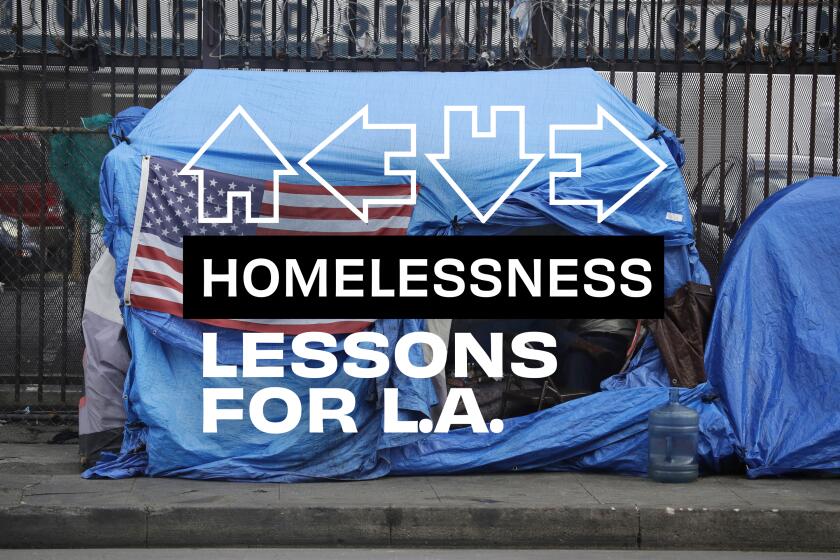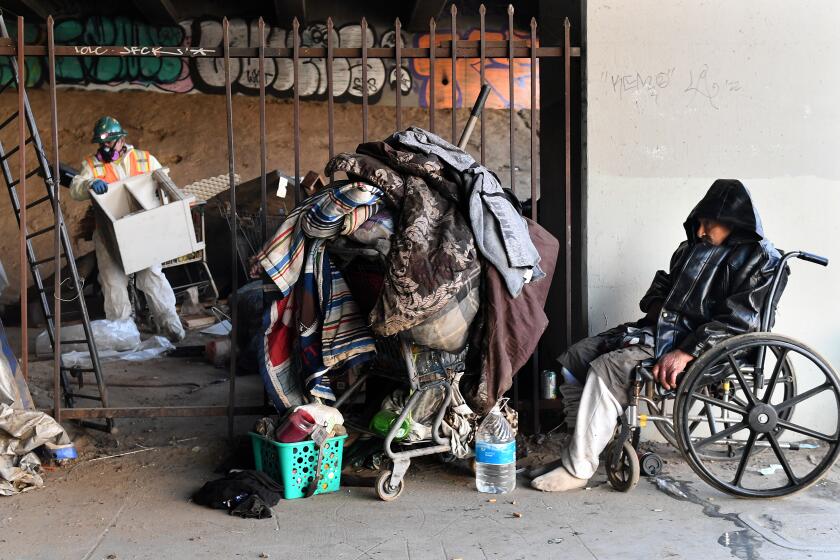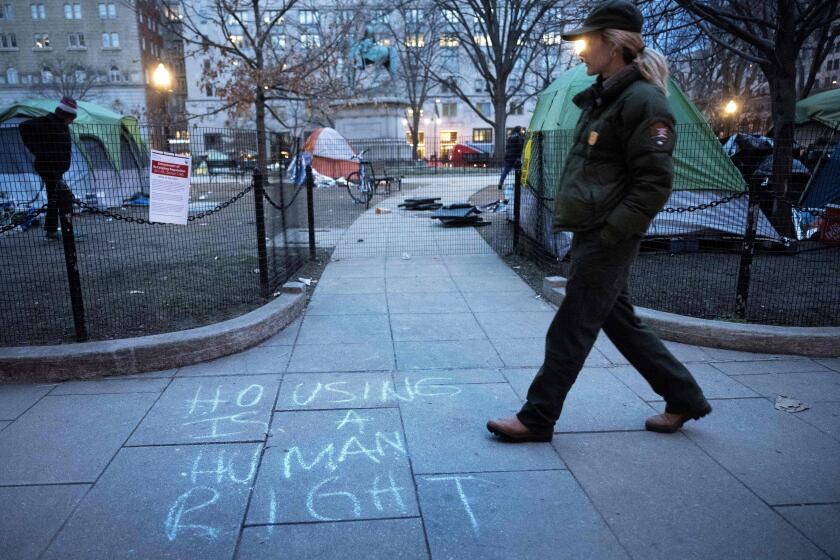Supreme Court to rule on clearing homeless encampments in California and the West

- Share via
WASHINGTON — The Supreme Court agreed Friday to decide whether homeless people have a constitutional right to camp on public property when they have no other place to sleep.
Acting on appeals from city officials in California and the West, the court will review decisions of the U.S. 9th Circuit Court of Appeals, which held it was cruel and unusual punishment for cities to deny homeless people a place to sleep.
As a result of the 9th Circuit rulings, public officials in California and the eight other Western states under its jurisdiction face greater scrutiny and legal challenges when they move to clear encampments or relocate homeless people.
Why is homelessness so much worse in Los Angeles than in other parts of the country, even as other cities also combat poverty, drug addiction and crime?
California Gov. Gavin Newsom and city attorneys from Los Angeles, San Francisco, San Diego and Phoenix were among two dozen government and business groups that urged the high court to restore their authority over sidewalks and parks, or at least to clarify the law.
City attorneys said it remains unclear whether encampments may be removed from sidewalks or parks if the people living on the street refuse an offer to move into temporary shelter.
They blame the 9th Circuit rulings — in cases from Boise, Idaho and Grants Pass, Ore. — for the worsening homelessness crisis in West Coast states. California alone is “home to half of the nation’s unsheltered population,” they said in their appeal in Grants Pass vs. Johnson.
The court said it would hear arguments in the case in April and issue a ruling by the end of June.
Rulings by the 9th Circuit Court of Appeals have made it harder for officials in California and other Western states to clear encampments. The Supreme Court could take up the issue early next year.
Newsom welcomed the court’s decision to hear the case.
“California has invested billions to address homelessness, but rulings from the bench have tied the hands of state and local governments to address this issue,” he said. “The Supreme Court can now correct course and end the costly delays from lawsuits that have plagued our efforts to clear encampments and deliver services to those in need.”
Theane Evangelis, the Los Angeles attorney who represents the city of Grants Pass, said she hopes the high court will agree the 9th Circuit’s rulings “are legally wrong and have tied the hands of local governments as they work to address the urgent homelessness crisis.”
But an Oregon attorney who sued on behalf of several homeless people in Grants Pass argued that cities have not been denied all authority to regulate encampments.
“The issue before the court is whether cities can punish homeless residents simply for existing without access to shelter,” said Ed Johnson, director of litigation at the Oregon Law Center. “Nevertheless, some politicians and others are cynically and falsely blaming the judiciary for the homelessness crisis to distract the public and deflect blame for years of failed policies.”
In the past, the 8th Amendment’s bar against inflicting “cruel and unusual punishments” has been applied by the Supreme Court to limit how the government deals with those convicted of crimes.
Advocates for the homeless point to a 1962 ruling that limited what can be considered a crime.
In Robinson vs. California, the Supreme Court struck down part of a California law that made it a crime to be addicted to narcotics. Lawrence Robinson had been arrested by Los Angeles police officers, who said his arm was discolored by “numerous needle marks.” He was tried, convicted and sentenced to 90 days in jail.
The Supreme Court later reversed his conviction and ruled it was cruel and unusual to punish someone, not for using or selling drugs, but for the “illness” of “narcotics addiction.”
In 2006, that ruling was cited by 9th Circuit judges to strike down a Los Angeles sidewalk ordinance that authorized police to arrest people who “lie or sleep” on the streets. The three-judge panel said homeless people were being punished simply because they had nowhere to sleep.
Rather than appeal to the Supreme Court, the city settled the case and agreed not to enforce its ordinance during overnight hours.
The 9th Circuit issued a broader ruling in 2018 that struck down ordinances in Boise, Idaho, that authorized police to arrest or fine people who were sleeping or camping on public property.
The judges said the Supreme Court’s Robinson decision established the “principle that the 8th Amendment prohibits the state from punishing an involuntary act or condition if it is the unavoidable consequence of one’s status or being.”
Grants Pass, a city of 38,000 people in southern Oregon, was estimated to have between 50 and 600 people who were homeless. In response to a suit by homeless advocates, a federal judge and 9th Circuit panel struck down its anti-camping ordinance because the city did not have “adequate shelter” for all of them.
“We affirm the district court’s ruling that the city of Grants Pass cannot, consistent with the 8th Amendment, enforce its anti-camping ordinances against homeless persons for the mere act of sleeping outside with rudimentary protection from the elements, or for sleeping in their car at night, when there is no other place in the city for them to go,” said Judge Roslyn Silver, who wrote the lower court opinion.
When the court’s conservatives moved to have the full 9th Circuit reconsider that ruling, they fell short by a 14-13 vote.
L.A. and D.C. are both grappling with the homeless crisis. But Washington looks and feels less saturated with homeless people than Los Angeles. Here’s why.
In their appeal to the Supreme Court, lawyers for the city emphasized the practical problems of homelessness.
“Across the West,” they said, “hundreds of thousands of people camp in public, their tents and belongings overtaking sidewalks, parks, and trails. Cities want to help those in encampments get the services they need while ensuring that our communities remain safe, but they find themselves hamstrung in responding to public encampments and the drug overdoses, murders, sexual assaults, diseases, and fires that inevitably accompany them.”
The closest the Supreme Court has come to ruling on the issue came in 1982. A group called the Community for Creative Non-Violence sought a permit for a demonstration in Lafayette Square across the street from the White House.
Their request included a “symbolic tent city” where about 50 people would sleep.
The Park Service approved the permit to demonstrate, but refused the request for sleeping in the park. The advocates sued, contending the ban on camping violated the 1st Amendment’s protection for free speech. They lost before a federal judge, won in the U.S. appeals court and finally lost 7 to 2 in the Supreme Court in 1984.
Writing for the court, Justice Byron White said the 1st Amendment permits reasonable limits on the “time, place and manner” of demonstrations. “We have very little trouble concluding that the Park Service may prohibit overnight sleeping in the parks involved here,” he wrote.
More to Read
Get the L.A. Times Politics newsletter
Deeply reported insights into legislation, politics and policy from Sacramento, Washington and beyond. In your inbox twice per week.
You may occasionally receive promotional content from the Los Angeles Times.














